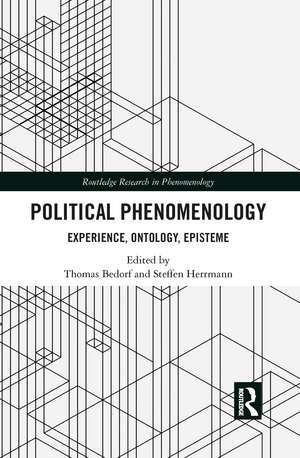Political Phenomenology: Experience, Ontology, Episteme: Routledge Research in Phenomenology
Editat de Thomas Bedorf, Steffen Herrmannen Limba Engleză Paperback – 30 iun 2021
| Toate formatele și edițiile | Preț | Express |
|---|---|---|
| Paperback (1) | 391.99 lei 43-57 zile | |
| Taylor & Francis – 30 iun 2021 | 391.99 lei 43-57 zile | |
| Hardback (1) | 769.10 lei 43-57 zile | |
| Taylor & Francis – 18 noi 2019 | 769.10 lei 43-57 zile |
Din seria Routledge Research in Phenomenology
-
 Preț: 311.41 lei
Preț: 311.41 lei -
 Preț: 325.49 lei
Preț: 325.49 lei -
 Preț: 311.41 lei
Preț: 311.41 lei -
 Preț: 326.49 lei
Preț: 326.49 lei -
 Preț: 389.38 lei
Preț: 389.38 lei -
 Preț: 416.22 lei
Preț: 416.22 lei -
 Preț: 450.40 lei
Preț: 450.40 lei -
 Preț: 437.28 lei
Preț: 437.28 lei - 17%
 Preț: 259.98 lei
Preț: 259.98 lei -
 Preț: 311.41 lei
Preț: 311.41 lei -
 Preț: 393.35 lei
Preț: 393.35 lei -
 Preț: 389.38 lei
Preț: 389.38 lei -
 Preț: 392.16 lei
Preț: 392.16 lei -
 Preț: 388.68 lei
Preț: 388.68 lei -
 Preț: 388.90 lei
Preț: 388.90 lei -
 Preț: 389.66 lei
Preț: 389.66 lei -
 Preț: 389.66 lei
Preț: 389.66 lei - 18%
 Preț: 1004.38 lei
Preț: 1004.38 lei - 18%
 Preț: 1009.43 lei
Preț: 1009.43 lei -
 Preț: 389.66 lei
Preț: 389.66 lei -
 Preț: 389.66 lei
Preț: 389.66 lei - 16%
 Preț: 260.13 lei
Preț: 260.13 lei - 33%
 Preț: 741.94 lei
Preț: 741.94 lei - 18%
 Preț: 1002.42 lei
Preț: 1002.42 lei - 18%
 Preț: 997.00 lei
Preț: 997.00 lei - 9%
 Preț: 1005.92 lei
Preț: 1005.92 lei - 9%
 Preț: 1005.34 lei
Preț: 1005.34 lei
Preț: 391.99 lei
Nou
Puncte Express: 588
Preț estimativ în valută:
75.01€ • 77.84$ • 62.70£
75.01€ • 77.84$ • 62.70£
Carte tipărită la comandă
Livrare economică 17-31 martie
Preluare comenzi: 021 569.72.76
Specificații
ISBN-13: 9781032085760
ISBN-10: 1032085762
Pagini: 372
Dimensiuni: 152 x 229 x 20 mm
Greutate: 0.51 kg
Ediția:1
Editura: Taylor & Francis
Colecția Routledge
Seria Routledge Research in Phenomenology
Locul publicării:Oxford, United Kingdom
ISBN-10: 1032085762
Pagini: 372
Dimensiuni: 152 x 229 x 20 mm
Greutate: 0.51 kg
Ediția:1
Editura: Taylor & Francis
Colecția Routledge
Seria Routledge Research in Phenomenology
Locul publicării:Oxford, United Kingdom
Public țintă
Postgraduate and UndergraduateCuprins
1. Three Types of Political Phenomenology
Thomas Bedorf and Steffen Herrmann
Part I. Phenomenology of Political Experiences
2. Dialectical Praxis and the Decolonial Struggle: Sartre and Fanon’s Contributions to Political Phenomenology
Robert Bernasconi
3. The Normative Force of Suffered Violence
Pascal Delhom
4. A Political Grammar of Feelings: Thinking the Political Through Sensitivity and Sentimentality
Brigitte Bargetz
5. Concernedness: For a Political Rehabilitation of an Unwelcome Affect
Emmanuel Alloa and Florian Grosser
6. The Shimmering Phenomenon of Clandestinity: Political Phenomenology Beside Appearing and Vanishing
Andreas Oberprantacher
Part II. Phenomenology of Political Ontology
7. Husserl and the Political: A Phenomenological Confrontation with Carl Schmitt and Alexandre Kojève
Bettina Bergo
8. Rethinking the Politics of Post-Truth with Hannah Arendt
Linda Zerilli
9. "Who One Is" – A Political Issue? Hannah Arendt on Personhood, Maximal Self, and Bare Life
Sophie Loidolt
10. Democracy and Terror: Toward a Phenomenology of (Dis-)Embodiment
Jacob Rogozinski
11. The Power of Public Assemblies: Democratic Politics Following Butler and Arendt
Gerhard Thonhauser
12. The Matter of the Other
Debra Bergoffen
Part III. Phenomenology of Political Episteme
13. Instituting Institutions: An Exploration of the Political Phenomenology of Stiftung
Thomas Bedorf
14. Intentionality, Representation, Recognition: Phenomenology and the Politics of A-Legality
Hans Lindahl
15. The Struggle for a Common World: From Epistemic Power to Political Action with Arendt and Fricker
Steffen Herrmann
16. Doing Gender Differently? The Embodiment of Gender Norms in between Permanence and Transformation
Maren Wehrle
17. Filling in the Blank: Art, Politics, and Phenomenology
Christian Grüny
Thomas Bedorf and Steffen Herrmann
Part I. Phenomenology of Political Experiences
2. Dialectical Praxis and the Decolonial Struggle: Sartre and Fanon’s Contributions to Political Phenomenology
Robert Bernasconi
3. The Normative Force of Suffered Violence
Pascal Delhom
4. A Political Grammar of Feelings: Thinking the Political Through Sensitivity and Sentimentality
Brigitte Bargetz
5. Concernedness: For a Political Rehabilitation of an Unwelcome Affect
Emmanuel Alloa and Florian Grosser
6. The Shimmering Phenomenon of Clandestinity: Political Phenomenology Beside Appearing and Vanishing
Andreas Oberprantacher
Part II. Phenomenology of Political Ontology
7. Husserl and the Political: A Phenomenological Confrontation with Carl Schmitt and Alexandre Kojève
Bettina Bergo
8. Rethinking the Politics of Post-Truth with Hannah Arendt
Linda Zerilli
9. "Who One Is" – A Political Issue? Hannah Arendt on Personhood, Maximal Self, and Bare Life
Sophie Loidolt
10. Democracy and Terror: Toward a Phenomenology of (Dis-)Embodiment
Jacob Rogozinski
11. The Power of Public Assemblies: Democratic Politics Following Butler and Arendt
Gerhard Thonhauser
12. The Matter of the Other
Debra Bergoffen
Part III. Phenomenology of Political Episteme
13. Instituting Institutions: An Exploration of the Political Phenomenology of Stiftung
Thomas Bedorf
14. Intentionality, Representation, Recognition: Phenomenology and the Politics of A-Legality
Hans Lindahl
15. The Struggle for a Common World: From Epistemic Power to Political Action with Arendt and Fricker
Steffen Herrmann
16. Doing Gender Differently? The Embodiment of Gender Norms in between Permanence and Transformation
Maren Wehrle
17. Filling in the Blank: Art, Politics, and Phenomenology
Christian Grüny
Notă biografică
Thomas Bedorf is Professor at the Institute of Philosophy at FernUniversität in Hagen, Germany.
Steffen Herrmann is Associate Professor at the Institute of Philosophy at FernUniversität in Hagen, Germany.
Steffen Herrmann is Associate Professor at the Institute of Philosophy at FernUniversität in Hagen, Germany.
Descriere
The chapters in this volume ask in a methodological and systematic way how phenomenology can connect first-person experience with normative principles in political philosophy. The chapters cover the phenomenology of political experience, the phenomenology of political ontology, and the phenomenology of political episteme.
